
Publisher:
Bonnie King
CONTACT:
Newsroom@Salem-news.com
Advertising:
Adsales@Salem-news.com

~Truth~
~Justice~
~Peace~
TJP
Jan-29-2012 15:24

 TweetFollow @OregonNews
TweetFollow @OregonNews
Remembering Vietnam
Ralph E. Stone Salem-News.comAfter 1,000 years of domination by China, Vietnam’s conflicts with the French and the U.S. were mere bumps in the road.
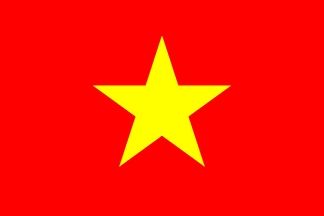 Flag of Vietnam |
(SAN FRANCISCO) - January 30th marks the forty-fourth anniversary of the beginning of the Tet Offensive, a defining event in the Vietnam War.
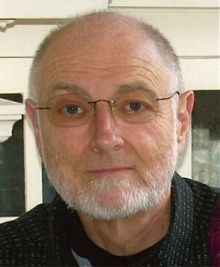 |
I was a U.S. Army Transportation officer stationed in Vietnam during the 1968 Tet Offensive.
General William Westmoreland commanded the U.S. military operations in the Vietnam War (1964–68), during the Tet Offensive. Tet by the way is the Vietnamese New Year.
We on the ground knew that Westmoreland's highly publicized, overly optimistic assessments of the war were not true.
We "won" every battle, but lost the war.
The 1968 Tet Offensive, in which communist forces, having staged a diversion at the Battle of Khe Sanh, attacked cities and towns throughout South Vietnam. U.S. and South Vietnamese troops successfully fought off the attacks, and the communist forces took heavy losses, but the ferocity of the assault shook public confidence in Westmoreland's previous assurances about the state of the war.
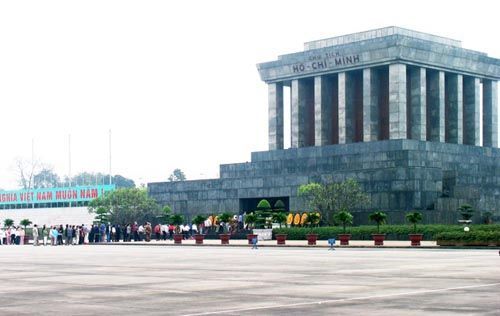 Waiting in line to visit the Ho Chi Minh Mausoleum in Hanoi (Photo by Judi Iranyi). |
War is a spectacular show when watched from afar, but not so much up close. I remember the B-52 carpet bombing that shook the earth and I watched from a rooftop as our helicopter gunships strafed the North Vietnamese and Viet Cong troops.
I could hear explosions throughout Saigon as the Viet Cong attacked police stations and other government buildings.
The U.S. military used Korean and Australian civilian workers who were housed in unprotected housing throughout Saigon.
Many were killed by the Viet Cong during the Tet Offensive.
After 1,000 years of domination by China, Vietnam’s conflicts with the French and the U.S. were mere bumps in the road.
I attended law school in Boston after the war at a time when the Boston/Cambridge area was a hotbed of anti-Vietnam activity.
Many of my fellow classmates were attending law school to avoid the draft and often kiddingly called me Captain America whenever the New York Times reported on the war.
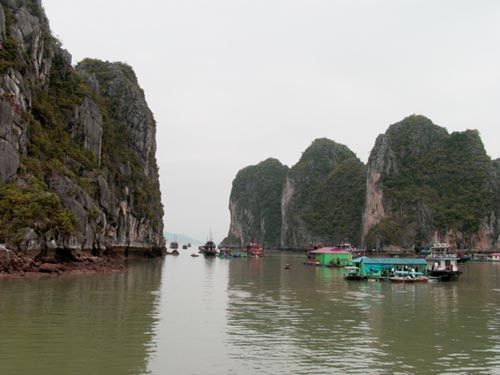 Halong Bay (Photo by Judi Iranyi). |
In 2006, I visited Vietnam with my wife. Our itinerary took us to Ho Chi Minh City (Saigon), My Tho, Tay Ninh, Vinh Trang, Minh City, Hue, Hoi An, Halong Bay, and Hanoi.
During the war, I did not appreciate what a beautiful country Vietnam is with its 2,000 mile coastline, jungles, beaches, and mountains and hills.
Vietnam is now one of the fastest growing economies in Southeast Asia. The U.S. signed a bilateral trade agreement in 2001; the U.S. is the sixth largest investor in Vietnam. Yesterday's enemy is today's friend.
We were greatly impressed by the excellent condition of Vietnam’s infrastructure, i.e., roads, bridges and public buildings. There was lots of construction going on around the country.
Ho Chi Minh City's (still commonly called Saigon) population in 1967 was approximately 1.7 million; today the population totals about 9 million. Vietnam is worried that Ho Chi Minh city is reaching a population saturation point.
And do the Vietnamese, especially in Hanoi and Saigon, have motorbikes? It seemed that every man, woman, and child had one. Motorbikes zoomed in and out of traffic and pedestrians seemed to be on the lowest rung on the traffic ladder... Walk/don’t walk signs blink at most corners, but in Vietnam, their message was purely theoretical.
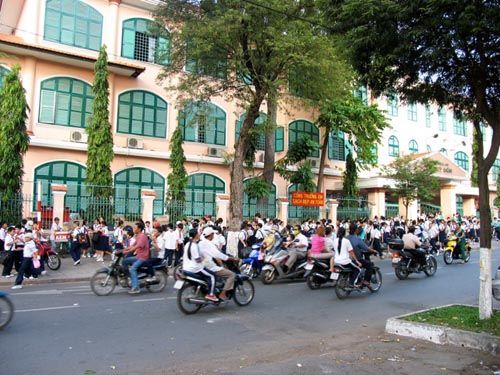 A busy street in Hue. (Photo by Judi Iranyi). |
What to do if hit by a motorbike: (1) when you regain consciousness, get up, stop the bleeding, and check for broken bones; (2) brush of your clothes; (3) apologize profusely to the bike operator for being so callous as to get in his or her way and hope for forgiveness; (4) offer to pay for any damages to the motorbike; and (5) if your injuries so require, go to the hospital. Only half kidding. Advice on crossing a street: first follow a Vietnamese across the street, but after awhile you get the hang of it.
While we were in Vietnam, an Agent Orange Conference was taking place. The U.S. military dumped 80 million litres of agent orange/dioxins in Vietnam. At least 2.1 million were victims of the toxins while another 4.8 million were indirectly affected.
We saw photos of some of the victims in the War Remnants Museum in Saigon. The dioxins effect those sprayed, and has caused birth defects in their children. Vietnamese victims were unsuccessful in obtaining compensation from the U.S. in a U.S. District Court.
Each of our three guides asked us if this was our first trip to Vietnam. I told him that I was a Vietnam veteran, stationed in Saigon in 1967-68.
Our Saigon guide told us that he was in the South Vietnam army and was stationed with the U.S. Marines in Danang.
After the U.S. defeat, he tried twice to escape, but was caught both times. He spent 2-1/2 years in prison. He is now an independent tour guide.
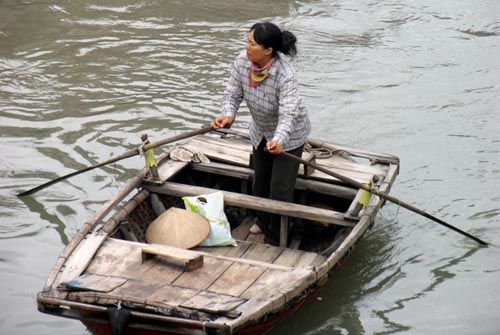 A woman navigates the Mekong Delta (Photo by Judi Iranyi). |
He then proceeded to point out some of the U.S. occupation sites, most of which have since been torn down to build office buildings and housing.
Our Hue/Hoi An guide asked me if I had left any children behind. A bit of an indelicate question in front of my wife. I said no.
Later we learned that he would have offered to assist me in finding these children if I had said yes. Our Hanoi/Halong Bay guide told us her father was in the North Vietnamese army and lost his leg in a landmine explosion. He still suffers pain.
Our visit to Saigon’s War Remnants Museum was a sobering highlight of our trip. As stated in the Museum’s brochure:
“The role of the unique museum . . . is to preserve and display exhibits on war crimes and aftermaths [of] foreign aggressive forces caused [to] Vietnamese people.” The photos are both gruesome and compelling.
One section called “Requiem,” contains a collection of photos taken by 134 war reporters -- from 11 different countries -- killed during the Vietnam War. The Epilogue to this section states in part: “[A] war in which so many died for illusions, and foolish causes, and mad dreams.”
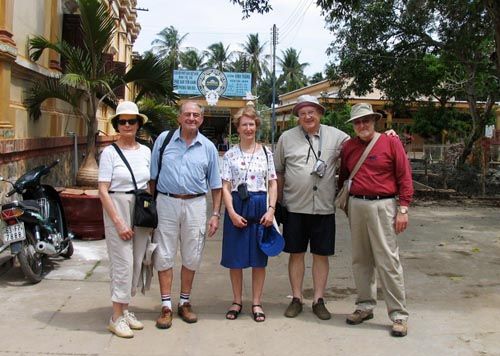 Two French Vietnam War veterans with their wives. I am wearing a red shirt. |
Thirty years after the war, former Secretary of Defense Robert McNamara in his book In Retrospect: The Tragedies and Lessons of Vietnam admitted we were wrong about Vietnam. Will we ever get a similar admission or apology about the Iraq and Afghanistan wars. I am not holding my breath.
It seems a lot of Americans, French, and Australians come back to the scene of our misadventures. Vietnam even offers tours to important war sites, such as the DMZ, the Cu Chi tunnels, and the so called Hanoi Hilton where Senator Bill McCain spent seven years.
It is now a museum with photos of the American prisoners and displays McCain’s flight suit.
A group of French veterans of the Vietnam War -- remember France's defeat at Dien Bien Phu in 1954 -- after learning that I too was a Vietnam veteran insisted on a group photo. There is an irony there someplace.
While in Vietnam, we picked up an English translation of a book called The Sorrows of War by Bao Ninh, a veteran of North Vietnam’s Youth Brigade Of the five hundred who went to war with the brigade in 1969, he is one of ten who survived.
It has been compared to Erich Remarque’s All Quiet On the Western Front. A compelling read.
Did we learn anything from the Vietnam War?
Apparently not, given our misadventures in Iraq and Afghanistan. As George Hegel observed, "The one thing history undoubtedly teaches us is that people have never learned anything from History."
 Salem-News.com writer Ralph E. Stone was born in Massachusetts. He is a graduate of both Middlebury College and Suffolk Law School. We are very fortunate to have this writer's talents in this troubling world; Ralph has an eye for detail that others miss. As is the case with many Salem-News.com writers, Ralph is an American Veteran who served in war. Ralph served his nation after college as a U.S. Army officer during the Vietnam war. After Vietnam, he went on to have a career with the Federal Trade Commission as an Attorney specializing in Consumer and Antitrust Law. Over the years, Ralph has traveled extensively with his wife Judi, taking in data from all over the world, which today adds to his collective knowledge about extremely important subjects like the economy and taxation. You can send Ralph an email at this address stonere@earthlink.net
Salem-News.com writer Ralph E. Stone was born in Massachusetts. He is a graduate of both Middlebury College and Suffolk Law School. We are very fortunate to have this writer's talents in this troubling world; Ralph has an eye for detail that others miss. As is the case with many Salem-News.com writers, Ralph is an American Veteran who served in war. Ralph served his nation after college as a U.S. Army officer during the Vietnam war. After Vietnam, he went on to have a career with the Federal Trade Commission as an Attorney specializing in Consumer and Antitrust Law. Over the years, Ralph has traveled extensively with his wife Judi, taking in data from all over the world, which today adds to his collective knowledge about extremely important subjects like the economy and taxation. You can send Ralph an email at this address stonere@earthlink.net
 |
 |
 |
 End Israeli apartheid |
Articles for January 28, 2012 | Articles for January 29, 2012 | Articles for January 30, 2012
Quick Links
DINING
Willamette UniversityGoudy Commons Cafe
Dine on the Queen
Willamette Queen Sternwheeler
MUST SEE SALEM
Oregon Capitol ToursCapitol History Gateway
Willamette River Ride
Willamette Queen Sternwheeler
Historic Home Tours:
Deepwood Museum
The Bush House
Gaiety Hollow Garden
AUCTIONS - APPRAISALS
Auction Masters & AppraisalsCONSTRUCTION SERVICES
Roofing and ContractingSheridan, Ore.
ONLINE SHOPPING
Special Occasion DressesAdvertise with Salem-News
Contact:AdSales@Salem-News.com

googlec507860f6901db00.html



Terms of Service | Privacy Policy
All comments and messages are approved by people and self promotional links or unacceptable comments are denied.
[Return to Top]
©2025 Salem-News.com. All opinions expressed in this article are those of the author and do not necessarily reflect those of Salem-News.com.